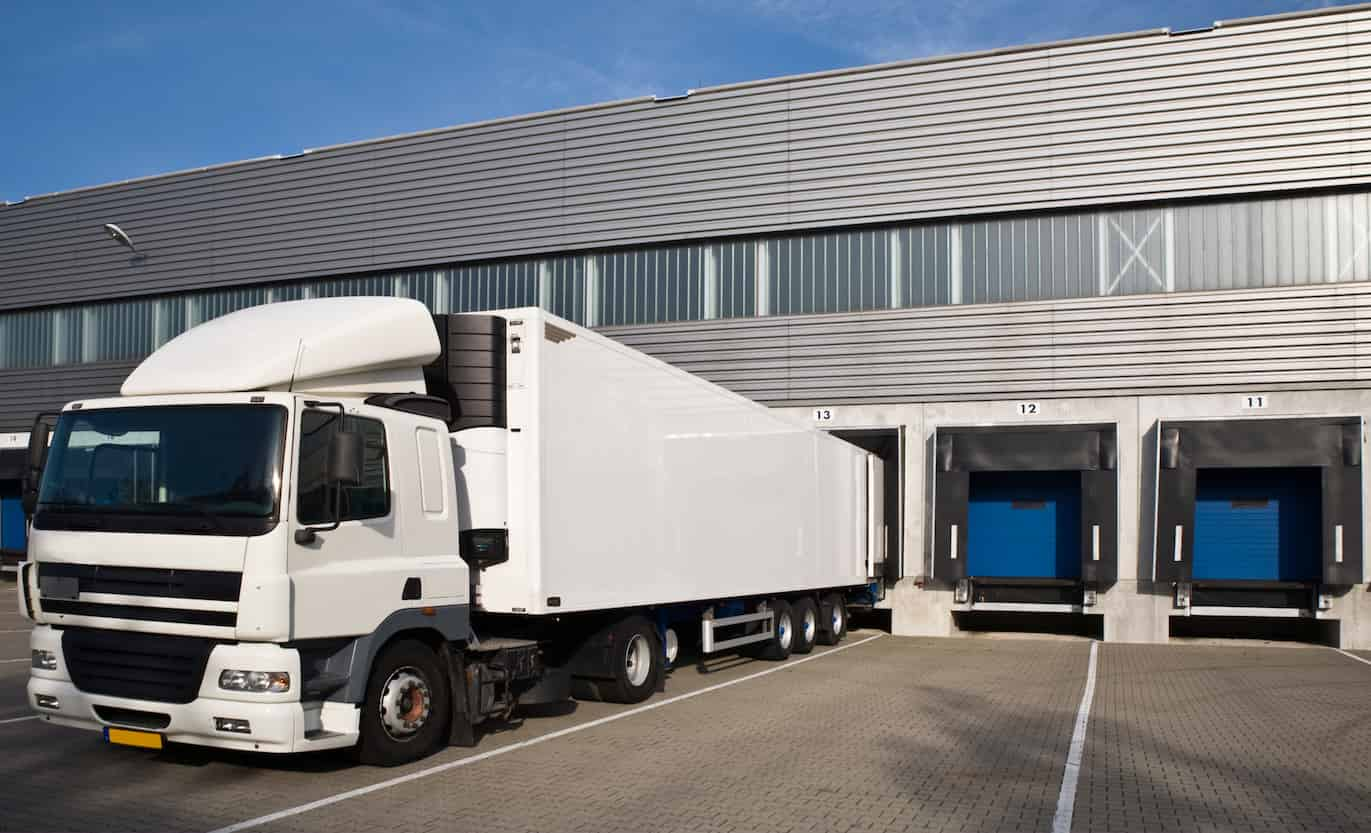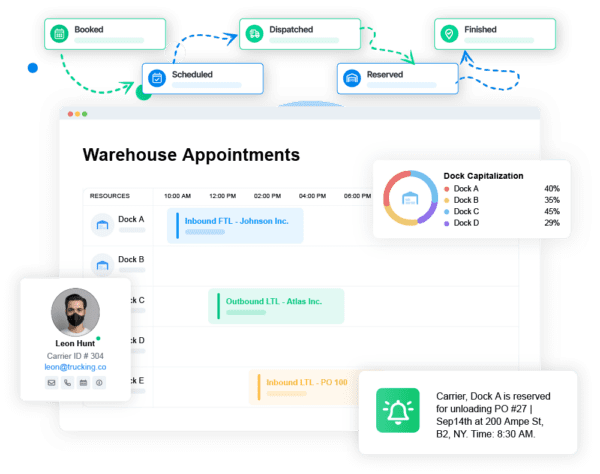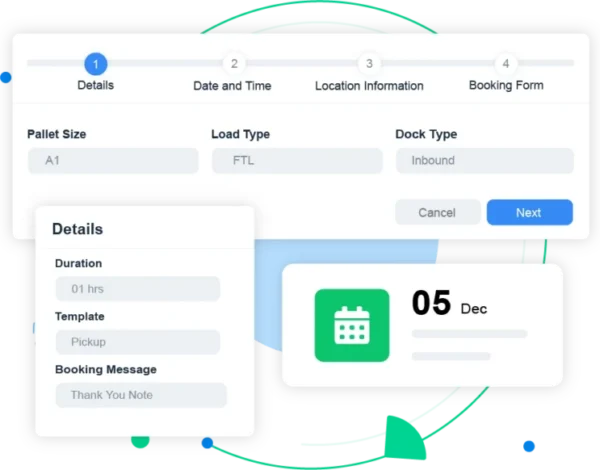
Ever have two trucks arrive at the same loading dock simultaneously? What if you could prevent that headache before it even happens?
It has become a new norm for carriers and warehouses to battle out such situations.
This scenario, known as double-booking, can cause a warehouse to become paralyzed. It triggers truck lineups, frustrated drivers, and costly fees.
Detention Charges:
In fact, 9 carriers have collected roughly $15.4 billion in detention/demurrage charges from April 1, 2020 to March 31,2025, much of it due to inefficient scheduling.
Double-booked docks and missed slots disrupt warehouse flow and lead to wasted labor hours and detention fees. In this blog, we’ll plunge into the causes, costs, and solutions for scheduling conflicts, showing how modern software restores control.
The Cost of Double-Booking in Warehouses
Double-booking means two (or more) shipments are scheduled for the same dock or time slot. In practice, it’s when an operator promises the same loading bay to multiple carriers at overlapping times. The result is immediate conflict. One truck must wait, stalling schedules, while others occupy space.
What is double-booking in warehouse scheduling?
In simpler terms, double-booking happens when two trucks are assigned to one dock slot. This can occur if different teams or carriers book independently, or if a previous appointment runs long without being updated.
In effect, two carriers show up at one dock; that’s a sure path to delays. Without a centralized system, these overlaps slip through, as teams often don’t know the schedules and ETAs of carriers in real time, so no one sees the conflict until it’s too late.
Common causes of double-booking
Manual scheduling processes: Relying on spreadsheets, paper logs, emails, and phone calls invites mistakes. Static lists get out of sync. It has been observed that this error-prone approach leads to double-bookings, idle dock doors, and immediate bottlenecks.
Lack of real-time visibility: When scheduling data lives in silos (like whiteboards or separate files), different people see different information. No one has the full up-to-the-minute picture, so two parties can easily assume the same slot is free.
Poor communication: Manual scheduling triggers a deluge of calls and emails, which causes misunderstandings. Industry analysts point out that miscommunication (especially over phone or email) is a top cause of conflicts. If a message is missed or details are misheard, two appointments can slip in.
Legacy tools and silos: Many warehouses still try to manage by hand. A traditional whiteboard or disconnected spreadsheets simply isn’t going to cut it at scale. When information is isolated, it’s easy to double-book without realizing it.
Operational and financial impact
Double-booking has tangible costs. When trucks pile up at the yard, delays multiply. Idle drivers often incur detention or demurrage fees (per-hour/day charges for waiting).
As mentioned earlier, the U.S. Federal Maritime Commission reports carriers collected about $15.4B in detention/demurrage from 2020–2025, and much of that can be traced to avoidable scheduling delays. Even without exact numbers, it’s clear that two trucks fighting for one dock means one is late, and fees stack up.
Besides fees, consider labor and service impacts. Overtime spikes when teams scramble to unload unexpected trucks. Backlogs can clog aisles, potentially triggering safety hazards or even fines. Missed shipments frustrate customers and carriers alike. In short, every double-booked slot hits your bottom line, from wasted labor hours to angry customers and delayed shipments.
Why Manual Scheduling Falls Short?
Attempting dock bookings by hand is an exercise in frustration:
Paper logs and spreadsheets create silos: When schedules are kept on paper or in isolated files, everyone’s in their own world. One industry guide warns that relying on spreadsheets, constant phone calls, and overflowing inboxes simply invites errors. A wall chart may work for one person, but it leaves the rest of the team blind to changes.
Lack of real-time dock visibility: With manual methods, there is no live schedule. If someone calls in a change or a truck runs late, that update might not reach the log for hours. Arrivy notes that without automation, warehouse teams often don’t know the schedules and ETAs of carriers. This information gap means two trucks can be promised the same slot.
High risk of human error: Every phone call, email, or data entry is an opportunity for a mistake. Moving one appointment by hand can introduce overlaps or gaps, which often leads to double-bookings. In practice, the more people and steps involved, the more likely an overlap will slip through.
In short, paper-based and disconnected scheduling make conflicts inevitable. Manual systems cannot enforce simple rules like one slot per truck, so errors happen constantly.
How Warehouse Appointment Scheduling Software Prevents Double-Booking?
Smart scheduling software fixes each manual weakness with automation and visibility:
Centralized dock calendar & real-time availability
With software, all appointments live in one digital calendar. When someone books a dock slot, the system immediately blocks it for everyone else. For example, Porter Logistics uses Arrivy’s interface to coordinate its refrigerated docks.
If Door A is booked from 9–10 AM, that slot is shown as taken to all other users. The software usually offers multiple views (daily chart, Kanban board, list view), so dispatchers, dockworkers, and drivers all see the same up-to-the-minute schedule.
Automated conflict detection and prevention
The system enforces booking rules automatically. If you try to book a slot that overlaps an existing appointment, the software blocks it or suggests a different time. Many platforms even auto-calculate slot durations based on load size.
For instance, Arrivy highlights that its automated calendars can cut double-bookings significantly. The software won’t let you double-book as the rule is coded in, so human oversight isn’t needed.
Role-based access for carriers, shippers, and staff
Modern systems segment users by role. Carriers often get a secure portal link where they see only available slots and book them (within the rules).
Shippers can request slots in advance. Warehouse managers and dispatchers see the full calendar and set policies (like maintenance blocks or shift changes).
This clear division means each party interacts with the schedule in the right way. For example, a carrier can’t override another shipper’s appointment, and internal staff can easily reassign if something changes.
Instant updates and confirmations
Every booking or change triggers automated notifications. When an appointment is made, updated or canceled, the system sends real-time alerts by email or text to all stakeholders.
For instance, a dock foreman might instantly receive: “Trailer arriving at Door 3 at 10:00 AM” once a driver books that slot. These instant updates keep everyone aligned as there’s no confusion about who has which slot.
Integration for seamless coordination
Many dock scheduling platforms offer integrations or APIs. This tight linkage ensures that dock scheduling is integrated into your end-to-end logistics process, eliminating duplicate data entry.
By providing a single source of truth and automated checks, warehouse scheduling software turns the act of booking into a controlled, error-free process.

Additional Benefits of Scheduling Software
Dock scheduling platforms bring many other advantages beyond avoiding collisions:
Optimized dock utilization and throughput
The software smoothens out the traffic. By spacing appointments evenly and assigning the right dock to each truck, it maximizes throughput. Companies report dramatic efficiency gains. In practice, a balanced schedule means fewer idle doors and shorter queues, so the warehouse handles more volume without adding docks or people.
Improved carrier relationships through self-scheduling
When carriers can book their own slots, relationships strengthen. Drivers appreciate knowing their appointment is confirmed and transparent. Self-service portals save carriers time as there is no more playing phone tag to find an open slot. Self-scheduling leads to stronger carrier relationships, since drivers prefer facilities that never waste their time. In short, granting autonomy and visibility makes carriers happier and more efficient.
Reduced detention and dwell time
A coordinated schedule means fewer truck lineups and less idle time. Each arrival can pull right into a ready dock. As Arrivy puts it, this leads to no detention fees or lineups under normal conditions. In dollar terms, that’s huge as every avoided hour of delay saves detention and labor costs. Many facilities report significant cost reductions after adopting scheduling software, as hidden dwell time disappears.
Analytics for peak-hour planning and demand forecasting
Finally, because every appointment is tracked digitally, scheduling software provides rich data insights. Managers can see historical trends, which days are busiest, which carriers cause delays, and how long unloading actually takes. Built-in dashboards highlight peak hours, recurring delays, and average dwell time by carrier. With these analytics, a warehouse can proactively staff up on Tuesdays or change a problematic workflow, rather than reacting to surprise jams.
Altogether, these benefits transform warehouse operations from firefighting into fine-tuned efficiency.
Arrivy’s Dock Scheduling Solution
Arrivy’s platform embodies the features above, with a focus on ease of use and collaboration:
Self-service portal for carriers and shippers: Arrivy gives carriers and suppliers a secure online link to view open slots and book appointments themselves. This one-click portal removes weeks of back-and-forth. Your customers can book anytime via a simple interface, with no cumbersome login needed. Repeat carriers get personalized portals showing upcoming bookings and history.
Historical booking data and real-time visibility: Arrivy logs every appointment and check-in. Dispatchers see a live dashboard of all upcoming loads, filterable by facility, dock, shift, or carrier. Past data is saved too, enabling reports on throughput and delays. This means you always know what’s on each dock right now and what’s coming next, so surprises are minimized and problems can be spotted early.
Smart scheduling that eliminates overlap: Arrivy supports custom booking rules. For example, Porter Logistics uses rules so only specific customers can book certain cold-storage docks, and long two-hour slots open automatically for extra-large trailers. The system even lets you set buffers between appointments or restrict docks by load type.
Trusted by 3PLs and logistics providers: Arrivy’s software is battle-tested in complex operations. Arrivy shows real-time availability by time slot and dock. For example, if a refrigerated door is booked in the 9–10 AM slot, other users immediately see that slot as taken, preventing double-booking. With Arrivy, even a hectic dock looks calm.
Final Thoughts
Double-booking isn’t a minor inconvenience but a costly breakdown. Every conflicted appointment ties up trucks, increases detention fees, and forces overtime. In contemporary supply chains, manual scheduling is a liability. A modern warehouse appointment scheduling system is the scalable, future-proof answer. It automates the booking process, enforces rules, and makes schedules transparent. In short, it moves your operation from chaos to control.
Warehouses ready to prevent these conflicts should consider solutions like Arrivy’s dock scheduling software. Its real-time calendar, smart rules, and carrier portal have helped clients transform their docks. To stop costly double-bookings and streamline your inbound/outbound flow, explore Arrivy’s scheduling platform. It’s built to eliminate overlaps and keep your operations running smoothly.

